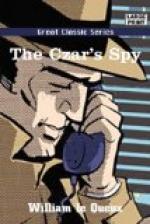He was a proud bully, possessing neither pity nor remorse, an average specimen of the high Russian official, a hide-bound bureaucrat, a slave to etiquette and possessing a veneer of polish. But beneath it all I saw that he was a coward in deadly fear of assassination—a coward who dreaded lest some secret should be revealed. That concealed door in the paneling with the armed guard lurking behind was sufficiently plain evidence that he was not the fearless Governor-General that was popularly supposed. He, “The Strangler of Finland,” had crushed the gallant nation into submission, ruining their commerce, sapping the country by impressing its youth into the Russian army, forbidding the use of the Finnish language, and taxing the people until the factories had been compelled to close down while the peasantry starved. And now, on the verge of revolt, there had arisen a band of patriots who resented ruin, and who had already warned his Majesty by letter that if Baron Oberg were not removed from his post he would die.
These and other thoughts ran through my mind in the silence that followed our heated argument, for I saw well that he was in actual fear of me. I had led him to believe that I knew everything, and that his future was in my hands, while he, on his part, was anxious to hold me prisoner, and yet dared not do so.
My wallet had probably been stolen by some lurking police-spy, for Russian agents abound everywhere in Finland, reporting conspiracies that do not exist and denouncing the innocent as “politicals.”
The Baron had halted, and was looking through one of the great windows down upon the courtyard below where the sentries were pacing. The palace was for him a gilded prison, for he dared not go out for a drive in one or other of the parks or for a blow on the water across to Hogholmen or Dagero, being compelled to remain there for months without showing himself publicly. People in Abo had told me that when he did go out into the streets of Helsingfors it was at night, and he usually disguised himself in the uniform of a private soldier of the guard, thus escaping recognition by those who, driven to desperation by injustice, sought his life.
A long silence had fallen between us, and it now occurred to me to take advantage of his hesitation. Therefore I said in a firm voice, in French—
“I think, Baron, our interview is at an end, is it not? Therefore I wish you good-day.”
He turned upon me suddenly with an evil flash in his dark eyes, and a snarling imprecation in Russian upon his lips. His hand still held the order committing me to the fortress.
“But before I leave you will destroy that document. It may fall into other hands, you know,” and I walked towards him with quick determination.
“I shall do nothing of the kind!” he snapped.
Without further word I snatched the paper from his thin white fingers and tore it up before his face. His countenance went livid. I do not think I have ever seen a man’s face assume such an expression of fiendish vindictiveness. It was as though at that instant hell had been let loose within his heart.




